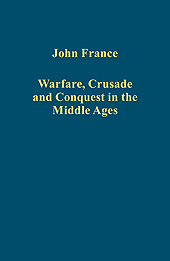John France
Warfare, Crusade and Conquest in the Middle Ages
(Ashgate: Variorum Collected Studies Series, 2015) 374pp. $165
Everybody knows the Variorum series by Ashgate, a series of books that puts together some of the best articles of well-known historians. In this occasion we have a book that gathers 18 articles written by John France between 1970 and 2015.
Although John France refuses to be labeled as a military historian he is, no doubt, one of the best medieval historian on this field. It is always a bit tricky to review this kind of works, especially when France, himself, has written a great review in the introduction of his book that can be downloaded from Ashgate´s website (http://www.ashgate.com/pdf/SamplePages/Warfare-Crusade-and-Conquest-in-the-Middle-Ages-Intro.pdf).
As John France points out, he has seen the renaissance of the studies on Medieval Military history almost from its new start in the late 1960´s or early 1970´s when this subject was still regarded as non- worthy of a true and proper historian. During the last 45 years he has become on the best and most interesting historians in the field of military medieval history, tackling some of the main subjects of the so called new military history, such as the approach to war from the society, logistics, crusades, new balance between infantry and cavalry and the role of battles; within a chronological framework that goes from the late 8th century to the early 12th.
In fact the book opens with an article on the culture of combat in the West where the cultural approach by Hanson and Keegan is contested. France reached some conclusions that resemble some of the thoughts put forward by M. Shaw in book published the same year as the article (2005, The new Western Way of War).
It is curious enough that in 2014 John France gave a lecture in Cambridge-within a conference on holy war in the early middle ages-, which updated his article from 2003, where, following the lives of the saints and their military or non-military prestige or aura, put in doubt Erdmann’s theory of a progressive evolution of the acceptance of the notion and practice of just and holy war within the Christian world. I believe that still Erdman has a good point but this an example of France work about not taking the things and theories as granted, or as an undisputed truth.
On the other hand, this book offers an original and new article by France in conjunction with N. Morton , on the situation of the Muslims territory on northern Syria, 1070-1130. It is a meritorious attempt, by non-Arabists, to depict the dramatic situation on that area on the eve of the Crusades. However I think that their conclusions are not so ground breaking as they claim to be. The situation of internal division between the Muslim powers is well known, as well the effects of those confrontation in a political, military and economic level. In fact the article presents some flaws. For example the note on schisms is merely trite. Some of the bibliography used is a bit weird. They do not use the works by Mutafian (2012) and Dadoyan (2013) on the Armenians and instead they trust a book written in 1986 on the subject. In the same way they do not seem to have used Cahen´s work from 1983 (Orient et Occident au temps des Croisades) and instead they used some of his older works. Nonetheless the authors suggest that the situation was even worse due to the confrontation between the newcomers, the new Turkish military elite versus the Arab population and elites, besides the well-known religious factor of division between Sunnies and Shi’ites. The situation of division and war zone enabled the triumph of the crusades and the initial pacts between some Muslim powers and population (mainly Arabs) with the Crusaders. Once the Turkish elites managed to control those rebel Arabs the situation changed, partially due to rising the flag of jihad against the Franks, not before 1120´s.
John France contribution to the Medieval military history is unquestionable. This book is a very worthy addition to the Variorum series, a must for any institution (or historian rich enough) interested not only on Military history but on how the Middle Ages worked.
Jose M. Rodriguez
Universidad Nacional de Educación a Distancia (Spain)

